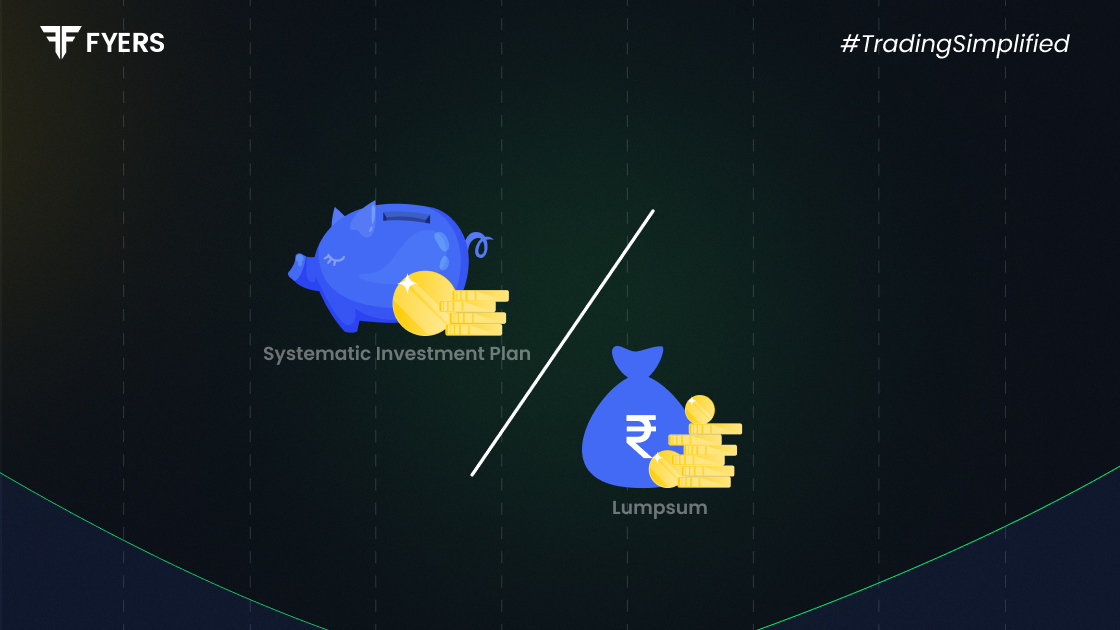

 3 Apr, 2025
3 Apr, 2025
 3 mins read
3 mins read

Mutual funds have established themselves as a preferred avenue of investments. Regarding mutual fund investments, you'll often hear about two primary approaches: Systematic Investment Plan (SIP) and lump sum investment. Understanding these approaches can help you make smarter financial decisions. In this article, we will understand what SIP and lumpsum are and the difference between SIP and lump sum.
A Systematic Investment Plan, or SIP, is a disciplined investment method where you invest a fixed amount of money at regular intervals. Think of it like a recurring deposit but for mutual funds. When you choose a SIP, you commit to investing a predetermined sum – say ₹5,000 – every month into a mutual fund of your choice.
Each month, a fixed amount is automatically deducted from your bank account and invested in the mutual fund. This approach allows you to benefit from the power of rupee cost averaging, a strategy that helps you navigate market volatility.
Lump sum investment is the opposite of SIP.
In this approach, you invest a large sum of money in one go. For example, if you have ₹1,00,000 available, you invest the entire amount at a single point in time. It is making a one-time, substantial investment in the market.
Many investors choose lump-sum investments when they have a significant amount of surplus funds. This could be from a bonus, sale of property, or accumulated savings. The key difference is the timing and amount of investment.
|
Feature |
SIP (Systematic Investment Plan) |
Lumpsum Investment |
|---|---|---|
|
Investment Approach |
Periodic investments of fixed amounts |
One-time investment of the entire amount |
|
Market Timing |
No need to time the market |
Requires good market timing |
|
Risk Exposure |
Reduced risk through rupee-cost averaging |
Higher exposure to market condition at time of investment |
|
Unit Acquisition |
More units when prices are low, fewer when high |
All units purchased at same price point |
|
Volatility Management |
Helps mitigate market volatility |
Fully exposed to market volatility |
|
Investment Discipline |
Enforces regular investment habit |
Requires one-time discipline |
|
Initial Capital Requirement |
Lower; can start with small amounts |
Higher; requires substantial initial capital |
|
Ideal For |
Regular income earners; beginners |
Investors with windfall gains; experienced investors |
|
Flexibility |
Can be started, stopped, or modified |
One-time decision |
|
Market Condition Suitability |
Works in both rising and falling markets |
Better returns in rising markets after investment |
SIP offers several advantages for investors.
First, it instills financial discipline. By committing to regular investments, you develop a consistent saving habit. You don't need a large amount to start – many mutual funds allow SIPs with as little as ₹500 per month.
Second, SIP provides flexibility. You can start, pause, or stop your investments easily. This makes it an attractive option for young professionals or those with fluctuating incomes. The power of compounding works in your favor, as your returns generate additional returns over time.
Lumpsum investments have their own set of advantages.
If you believe the market is at a low point, investing a large sum can help you capitalise on potential growth. Experienced investors who understand market cycles might find lumpsum investments more suitable.
Additionally, lumpsum investments can be more cost-effective. Since you're making a single transaction, you save on multiple transaction costs associated with regular SIP investments. For those with significant surplus funds, this method offers immediate market exposure.
Your choice depends on various factors like your financial goals, risk tolerance, and available funds. If you're a salaried professional looking to build wealth gradually, SIP might be your best bet. If you have a substantial amount and strong market insights, a lumpsum could work well.
For most Indian investors, a combination of both strategies often yields the best results. You might start with SIP for regular investments and use lumpsum for additional, opportunistic investments.
Generally, SIP is considered less risky because it spreads your investment over time. You're not exposed to market volatility as significantly as in lumpsum investments.
Yes, most mutual fund schemes allow you to switch between SIP and lump sum. However, always check the specific terms of your fund.
Returns depend on market conditions. SIP tends to provide more consistent returns, while a lump sum can offer higher returns if timed correctly.
Both SIP and lump sum are taxed similarly based on the type of mutual fund and holding period. Equity funds have different tax treatment compared to debt funds.
Calculate your Net P&L after deducting all the charges like Tax, Brokerage, etc.
Find your required margin.
Calculate the average price you paid for a stock and determine your total cost.
Estimate your investment growth. Calculate potential returns on one-time investments.
Forecast your investment returns. Understand potential growth with regular contributions.